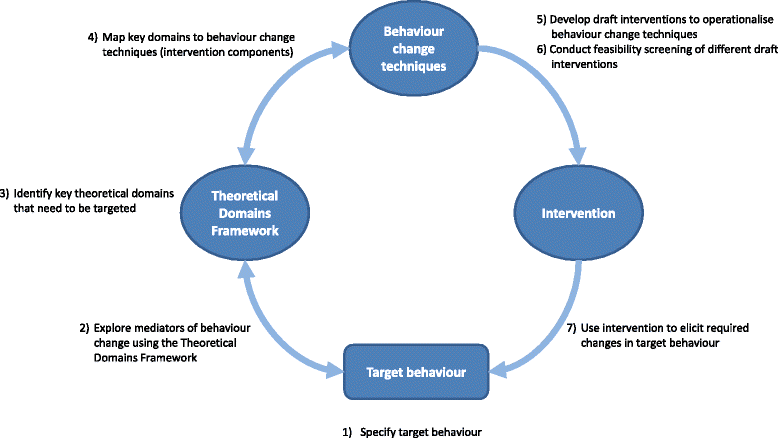Development of an intervention to improve appropriate polypharmacy in older people in primary care using a theory-based method
- PMID: 27852287
- PMCID: PMC5112618
- DOI: 10.1186/s12913-016-1907-3
Development of an intervention to improve appropriate polypharmacy in older people in primary care using a theory-based method
Abstract
Background: It is advocated that interventions to improve clinical practice should be developed using a systematic approach and intervention development methods should be reported. However, previous interventions aimed at ensuring that older people receive appropriate polypharmacy have lacked details on their development. This study formed part of a multiphase research project which aimed to develop an intervention to improve appropriate polypharmacy in older people in primary care.
Methods: The target behaviours for the intervention were prescribing and dispensing of appropriate polypharmacy to older patients by general practitioners (GPs) and community pharmacists. Intervention development followed a systematic approach, including previous mapping of behaviour change techniques (BCTs) to key domains from the Theoretical Domains Framework that were perceived by GPs and pharmacists to influence the target behaviours. Draft interventions were developed to operationalise selected BCTs through team discussion. Selection of an intervention for feasibility testing was guided by a subset of the APEASE (Affordability, Practicability, Effectiveness/cost-effectiveness, Acceptability, Side-effects/safety, Equity) criteria.
Results: Three draft interventions comprising selected BCTs were developed, targeting patients, pharmacists and GPs, respectively. Following assessment of each intervention using a subset of the APEASE criteria (affordability, practicability, acceptability), the GP-targeted intervention was selected for feasibility testing. This intervention will involve a demonstration of the behaviour and will be delivered as an online video. The video demonstrating how GPs can prescribe appropriate polypharmacy during a typical consultation with an older patient will also demonstrate salience of consequences (feedback emphasising the positive outcomes of performing the behaviour). Action plans and prompts/cues will be used as complementary intervention components. The intervention is designed to facilitate the prescribing of appropriate polypharmacy in routine practice.
Conclusion: A GP-targeted intervention to improve appropriate polypharmacy in older people has been developed using a systematic approach. Intervention content has been specified using an established taxonomy of BCTs and selected to maximise feasibility. The results of a future feasibility study will help to determine if the theory-based intervention requires further refinement before progressing to a larger scale randomised evaluation.
Keywords: APEASE; Behaviour change; Dispensing; Feasibility; Intervention; Polypharmacy; Prescribing; Theoretical domains framework.
Figures
References
-
- French SD, Green SE, O’Connor DA, McKenzie JE, Francis JJ, Michie S, Buchbinder R, Schattner P, Spike N, Grimshaw JM. Developing theory-informed behaviour change interventions to implement evidence into practice: a systematic approach using the theoretical domains framework. Implement Sci. 2012;7:38. doi: 10.1186/1748-5908-7-38. - DOI - PMC - PubMed
-
- Medical Research Council. Developing and Evaluating Complex Interventions: New Guidance. London: Medical Research Council; 2008.
-
- Angus D, Brouwers M, Driedger M, Eccles M, Francis J, Godin G, Graham I, Grimshaw J, Hanna S, Harrison MB. Designing theoretically-informed implementation interventions The Improved Clinical Effectiveness through Behavioural Research Group (ICEBeRG) Implement Sci. 2006;1:4. doi: 10.1186/1748-5908-1-4. - DOI - PMC - PubMed
MeSH terms
Grants and funding
LinkOut - more resources
Full Text Sources
Other Literature Sources
Medical


